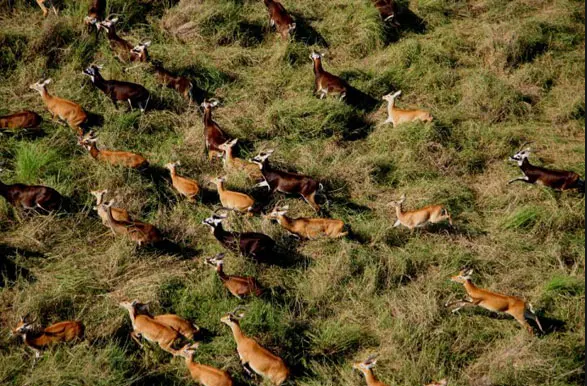The Director-General at the Ministry of Wildlife Conservation and Tourism, Lt. Gen. Khamis Adiang Diing, has revealed that poachers outgun wildlife rangers and officers in South Sudan and that the vice of poaching is on the rise because communities have abandoned agriculture.
In an exclusive interview with Radio Tamazuj, Gen. Adiang also said that his ministry is underfinanced which means they cannot fully contain poaching.
Below are edited excerpts:
Q: It has been reported that there is increased poaching in South Sudan. What is your ministry doing to contain it?
A: The level of random parching in South Sudan is very high and we attribute this to communities not engaging in farming activities. That is why many people have sought to engage in random poaching activities. We are working hard to control these activities through our regular patrols in limited areas due to our limited mobility.
We have managed to apprehend some individuals believed to be involved in such poaching activities and we have currently taken some to court for trial. We have also tried to make some conservation mechanism policies clear to our people so that they understand that random poaching is harmful and destroys our national resources.
Q: Do you have policy guidelines for the wildlife industry and are officials and the citizenry aware of them?
A: We are among the few ministries that have a policy framework and our national parliament has passed it and we are currently implementing this policy to administer our national protectorates in different parts of the country.
Q: You recently arrested alleged poachers. How many are they?
A: I cannot give you the exact figure at the moment because every day we arrest new violators. As we speak, we have more than 90 cases being tried in the courts of law.
Q: We learned that you work with various regional and international organizations. Who are they and have they helped in curbing poaching?
A: Yes! We have some organizations that are helping us. For example, we asked the South African-based NGO African Parks to develop some of the local parks like Badingilo and Boma National Park. There is also Fauna & Flora International (FFI) providing support encompassing the Wildlife Service (WLS) and local communities through technical expertise and direct funding for the improved conservation management of three of the country’s protected areas (PAs) in Western Equatoria State. We also have cooperation with UNMISS. So, we are open to anybody who wants to work in the field of wildlife conservation.
Q: Has your ministry made any tangible contributions to the economic growth of South Sudan since its independence?
A: I doubt it but we are now putting the basics in place and very soon we expect to make a very significant contribution to the country’s economy.
Q: What percentage of the national budget is allocated to wildlife conservation?
A: I am not sure but the amount we receive is very little to run the day-to-day activities of the ministry.
Q: What are the major challenges you face in your work?
A: Challenge number one is insufficient budget. The budget is completely not enough to cover all our activities in far and near locations across the country. Number two is the high level of poaching all over the country because of the large amounts of illegal firearms in the hands of civilians.
The third challenge is that our people do not take conservation seriously and their perception is that every animal must be killed and eaten.
Q. It has been reported that poachers are more heavily armed than your wildlife officers. Is this true and what are you doing to counter it?
B: It is true. You know, if I continue listing challenges it will be a long list. We are unable to move from one place to the other due to a lack of mobility. Firearms and ammunition are almost zero. So, you encounter somebody who is more highly armed than you. You can imagine what will happen. The issue of uniforms for rangers has also not been resolved up to now. So, I do not know what the future holds.
Q: Some animals migrated to neighboring countries during the long years of war. Will they return?
A: Animals are normally driven away by manmade activities such as fire, killing, and war but they normally come back because they do not develop physical boundaries. So, the idea that our animals that have moved to Uganda or Kenya will never come back is not true.
They move from our place to other places seeking their biological requirements and this is what we call migration. There is daily migration and annual migration. So, it is a movement to look for their requirements in a specific area so they go and come.
Q: What is your message to the people of South Sudan?
A: The message to our countrymen in the Republic of South Sudan is that we should start to change our attitudes and perceptions towards wildlife because it is a renewable resource. We are one of the largest countries in Africa if not the world and we have a very high population of animals. If we pay attention to our wildlife, it will be the number one revenue-generating source in the country. So, please stop killing wildlife.




